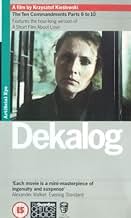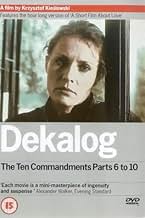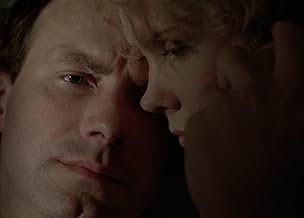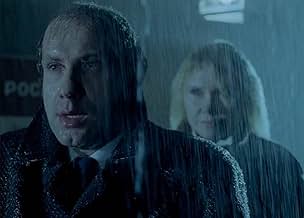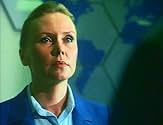Dekalog, dziewiec
- Episode aired Jun 29, 1990
- TV-MA
- 1h
IMDb RATING
8.0/10
3.8K
YOUR RATING
Following the discovery of his sexual impotence a man urges his wife to take a lover.Following the discovery of his sexual impotence a man urges his wife to take a lover.Following the discovery of his sexual impotence a man urges his wife to take a lover.
- Director
- Writers
- Stars
- Director
- Writers
- All cast & crew
- Production, box office & more at IMDbPro
Featured reviews
Decalogue 9 - "Thou shalt not covet thy neighbor's wife" is a story of the words misinterpreted, the important phone calls missed by a second. The loving couple has to deal with the serious problems that include the husband's impotence and the wife's infidelity. She loves her husband and does not want to leave him even after she learns the sad truth about his condition. She wants to end a strictly physical affair with a younger boyfriend. Her husband does not know that and the tragedy of errors just about to happen
Decalogue 9 is also interesting because in it we first meet the main character of Kieslowski's later film, "Double Life of Veronique." Roman, the hero of Decalogue 9 is a heart surgeon and works in the hospital. One of his patients is a young, full of life girl who loves to sing and has a heart condition. Her favorite composers are Bach, Mozart, and Van den Budenmayer (a fictitious Dutch composer whose music is written by the regular Kieslowski's associate, Zbigniew Preisner).
9/10
Decalogue 9 is also interesting because in it we first meet the main character of Kieslowski's later film, "Double Life of Veronique." Roman, the hero of Decalogue 9 is a heart surgeon and works in the hospital. One of his patients is a young, full of life girl who loves to sing and has a heart condition. Her favorite composers are Bach, Mozart, and Van den Budenmayer (a fictitious Dutch composer whose music is written by the regular Kieslowski's associate, Zbigniew Preisner).
9/10
An episod about its viewers. Doubts and generosity, fear and trust. And the impecable mannonesty. And about the structure of vulnerability. All - simple and clear and powerfull. er to show an ordinary story defining its basic traits. A husband and his wife. A good advice and a secret. The appearences. And the cold truth. But, more important, the right choice. The atmosphere is the lead pillar. Sure, each episode is defined but atmosphere but in this case , it represents the key for define attitudes, thoughts, gestures and decisions. A film about the roots of h
'Dekalog' is a towering achievement and a televisual masterpiece that puts many feature films to shame, also pulling off a concept of great ambition brilliantly. Although a big admirer of Krzysztof Kieślowski (a gifted director taken from us too early), and who has yet to be disappointed by him, to me 'Dekalog' and 'Three Colours: Red' sees him at his best.
All of 'Dekalog's' episodes have so many great things, and it is an example of none of the lesser episodes (my least favourite being the still very good Episode 8) being bad. This is testament to the high quality of 'Dekalog' as an overall whole and how brilliant the best episodes are.
Episode 9 is yet another great one from 'Dekalog'. The story is one of the slighter ones of the series, but that is by no means a flaw. My only complaint is the middle act dragging a little bit, otherwise Episode 9 is great stuff while falling short of being one of the best 'Dekalog' stories like Episodes 1, 4, 5 and 6.
As per usual, it is exceptionally well made. The production values in Episode 9 are as ever atmosphere-enhancing, beautiful and haunting to look at and fascinating, definitely cannot be faulted on the technical front. The direction is quietly unobtrusive, intelligently paced and never too heavy, and the music is suitably intricate.
Characters are interesting, well-developed and feel like real people in a compelling sense. The story is thematically rich with much to say about its central conflict of sexuality and love. They are explored intelligently without descending into heavy-handedness, and the episode is powerfully moving, thought-provoking and life-affirming. The acting is superb as to be expected, with complexity and nuances by the bucket-load.
All in all, great 'Dekalog' episode but not one of the series' finest. 9/10 Bethany Cox
All of 'Dekalog's' episodes have so many great things, and it is an example of none of the lesser episodes (my least favourite being the still very good Episode 8) being bad. This is testament to the high quality of 'Dekalog' as an overall whole and how brilliant the best episodes are.
Episode 9 is yet another great one from 'Dekalog'. The story is one of the slighter ones of the series, but that is by no means a flaw. My only complaint is the middle act dragging a little bit, otherwise Episode 9 is great stuff while falling short of being one of the best 'Dekalog' stories like Episodes 1, 4, 5 and 6.
As per usual, it is exceptionally well made. The production values in Episode 9 are as ever atmosphere-enhancing, beautiful and haunting to look at and fascinating, definitely cannot be faulted on the technical front. The direction is quietly unobtrusive, intelligently paced and never too heavy, and the music is suitably intricate.
Characters are interesting, well-developed and feel like real people in a compelling sense. The story is thematically rich with much to say about its central conflict of sexuality and love. They are explored intelligently without descending into heavy-handedness, and the episode is powerfully moving, thought-provoking and life-affirming. The acting is superb as to be expected, with complexity and nuances by the bucket-load.
All in all, great 'Dekalog' episode but not one of the series' finest. 9/10 Bethany Cox
I'm a bit upset at our filmmaker.
I know that each of these ten is its own little experiment. Each has its own adventure in vision and dreaming. But all ten have an arc as well. Oh, not in the stories; they're good enough in their way. What I mean is the cadence that comes from the difference in how each of these sees.
Some have an eager eye, others lazy. Sometimes the eye is inside the emotional container of the thing. Sometimes, often, the camera is liquid on some surface that is emotionally tipped. They're all different, and together we have a sort of poem in how the rocks are arranged in the sky for us to see as art after we have seen the immediate art by standing on each of them.
So we are nearing the end, and this penultimate eye is essential to giving us distance.
Sure enough, almost everything about this is perfect. Its about spying, about placing yourself to see hoping to not get hit by what we see and knowing we will.
There's lots of architectural framing, interstitial platforms and invaginations. Its about children lost before they were had, the greatest tragedy.
So why am I miffed, if it is so perfect, so delicately jolting? Because in the final scene he leaves his Kieslowski world and gives us a shot so banal, so ordinary, so conventionally shot we wonder what he was thinking. Its a phone call, alternating between the husband calling and the wife receiving.
Its a Hitchcock-derived shot. Now don't get me wrong, Hitchcock invented the curious, floating camera that Kieslowski (and Chris Doyle) exploit. But his setups are so quoted now that to use one today is almost a matter of parody. And that's what we are left with.
I can only assume that the difference was intended, that our filmmaker wanted to let us know that things will be different now. That it will now be "real" and not a man and woman acting real and watching themselves work at it.
But it is shocking, that call.
Ted's Evaluation -- 3 of 3: Worth watching.
I know that each of these ten is its own little experiment. Each has its own adventure in vision and dreaming. But all ten have an arc as well. Oh, not in the stories; they're good enough in their way. What I mean is the cadence that comes from the difference in how each of these sees.
Some have an eager eye, others lazy. Sometimes the eye is inside the emotional container of the thing. Sometimes, often, the camera is liquid on some surface that is emotionally tipped. They're all different, and together we have a sort of poem in how the rocks are arranged in the sky for us to see as art after we have seen the immediate art by standing on each of them.
So we are nearing the end, and this penultimate eye is essential to giving us distance.
Sure enough, almost everything about this is perfect. Its about spying, about placing yourself to see hoping to not get hit by what we see and knowing we will.
There's lots of architectural framing, interstitial platforms and invaginations. Its about children lost before they were had, the greatest tragedy.
So why am I miffed, if it is so perfect, so delicately jolting? Because in the final scene he leaves his Kieslowski world and gives us a shot so banal, so ordinary, so conventionally shot we wonder what he was thinking. Its a phone call, alternating between the husband calling and the wife receiving.
Its a Hitchcock-derived shot. Now don't get me wrong, Hitchcock invented the curious, floating camera that Kieslowski (and Chris Doyle) exploit. But his setups are so quoted now that to use one today is almost a matter of parody. And that's what we are left with.
I can only assume that the difference was intended, that our filmmaker wanted to let us know that things will be different now. That it will now be "real" and not a man and woman acting real and watching themselves work at it.
But it is shocking, that call.
Ted's Evaluation -- 3 of 3: Worth watching.
This is one of the most potent Dekalogs for a while. The setup is one of those brilliant Kieslowski touches of sending us echoes that we're uncertain if from a hazy future or from inside the soul. He had plans to turn this into a third Short Film but gave up after exhaustion.
A husband discovers he's unable to have children, the doctor suggesting divorce, the end of his marriage. This is interlaid with shots of the wife back home looking for him in an empty apartment. There's a desolate sense between the two of them, something lost along the way and no one looked for it to put it back in. They lay on the same bed now, he has shared the news, and suggests she takes up an affair.
But is all of this, as in film noir, a dreamlike urge of pushing her away from him, or deep down wanting to? At the hospital where he works we get the sense that he's fascinated by a young patient who has a lovely voice but her heart might give way if she becomes a singer. She is content to not pursue this love.
So there is something, the Kieslowskian touch as I am discovering with these Dekalogs, of elusively inhabiting something that's been laying in wait and opens chasms in who these characters are. What we see may be what she's thought about before in a marriage that was draining itself away.
But then it slowly drains itself away. It sets itself up for formulaic surprises where now the boyfriend shows up where she went on a trip and he finds out and is heartbroken. We have what's by now a very typical tension in the series. If you have seen previous Dekalogs in a row, like I did, this will be slight by now.
A husband discovers he's unable to have children, the doctor suggesting divorce, the end of his marriage. This is interlaid with shots of the wife back home looking for him in an empty apartment. There's a desolate sense between the two of them, something lost along the way and no one looked for it to put it back in. They lay on the same bed now, he has shared the news, and suggests she takes up an affair.
But is all of this, as in film noir, a dreamlike urge of pushing her away from him, or deep down wanting to? At the hospital where he works we get the sense that he's fascinated by a young patient who has a lovely voice but her heart might give way if she becomes a singer. She is content to not pursue this love.
So there is something, the Kieslowskian touch as I am discovering with these Dekalogs, of elusively inhabiting something that's been laying in wait and opens chasms in who these characters are. What we see may be what she's thought about before in a marriage that was draining itself away.
But then it slowly drains itself away. It sets itself up for formulaic surprises where now the boyfriend shows up where she went on a trip and he finds out and is heartbroken. We have what's by now a very typical tension in the series. If you have seen previous Dekalogs in a row, like I did, this will be slight by now.
Did you know
- TriviaKieslowski and co-screenwriter Krzysztof Piesiewicz expressed an affection for the character of the young singer who contemplates surgery, and they lamented the fact that there was little for her to do in this story. When they began writing "The Double Life of Veronique", they remembered the plight of the singer in Dekalog - how her passion was limited by her sickness - and transferred this storyline over to the characters of Veronique and Weronika.
- ConnectionsReferenced in Three Colors: Red (1994)
Details
Contribute to this page
Suggest an edit or add missing content

